The Great Re-learning Revolution
21/05/2024
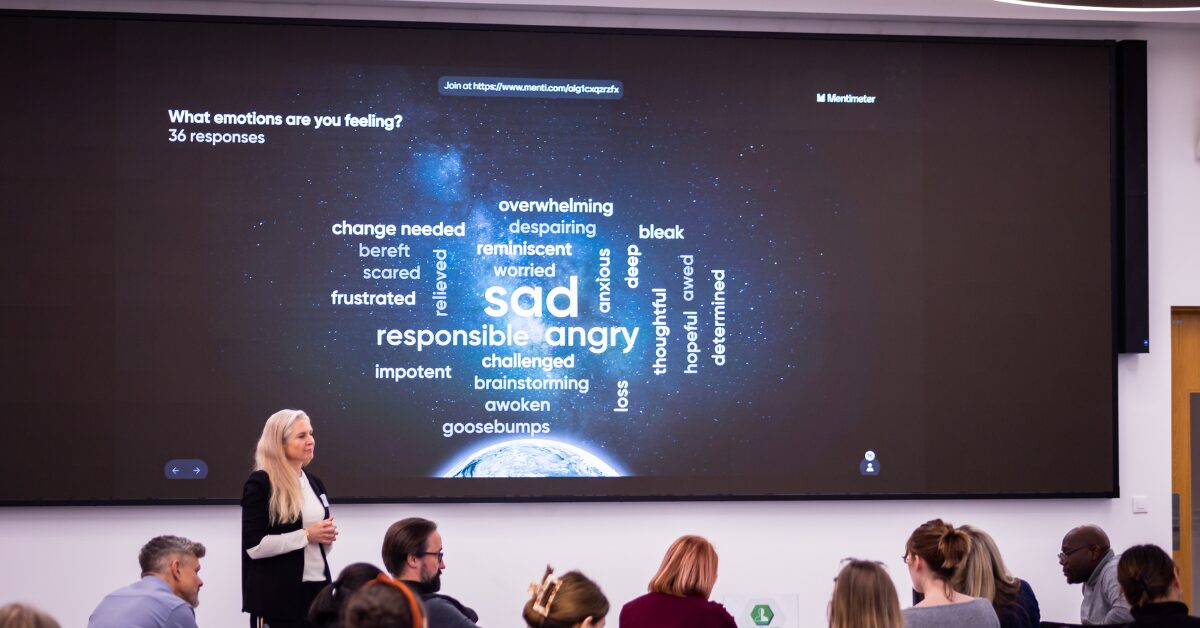
Achieving a sustainable future requires all of us to relearn our world and ourselves. It involves rethinking how we live, work, and do business, and understanding the steps people and organisations can take to drive these changes. And just like our very first learning experiences as children, transformative and rapid in nature, this re-learning can be encouraged by harnessing those first building blocks of life-emotional connection, psychological safety, and creativity.
The Sustainable Business group at Cranfield University has developed an immersive experience to accelerate this learning through an experiential, transformational journey to the future. This game has been played with over 2,000 post-graduate students, executives and academics, and is a feature of the cross disciplinary Sustainability Business Specialist Apprenticeship.
Transformative learning requires emotional connection, safety and creativity
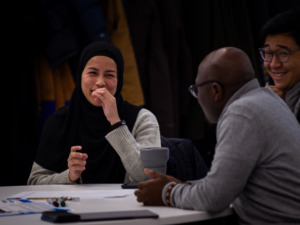
Managers and leaders need new competencies to lead their organisations to a more sustainable future, in collaboration with others in society¹. When we talk about education for sustainable development, we’re not just talking about learning facts and figures. Transformative learning isn’t just about changing our minds; it’s about changing our hearts and actions too². Emotions play a big part in transformative learning. Sometimes, students need to go through an emotional journey to really change the way they see things³.
We learn best when we can apply what we’ve learned in real-life situations and then reflect on those experiences⁴, it’s all about learning by doing and then thinking about what we did. Serious games, as they’re called, aren’t just for fun; they’re also a powerful way to learn about sustainability⁵. Games let us explore different scenarios and solutions in a safe environment. They help us imagine possible futures and come up with creative solutions to real-world problems⁶. Plus, they’re engaging because they involve uncertainty and emergence, just like real life⁷. So, by playing games, we can learn and grow in ways that traditional teaching methods might not allow.
Role playing provokes players to reflect on own actual beliefs and ability to influence change
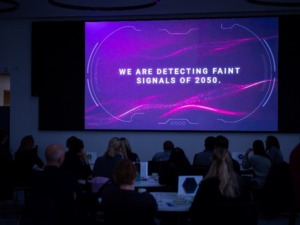
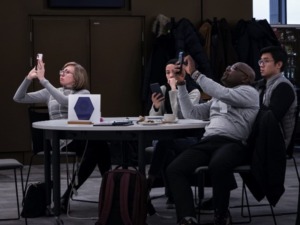
The Exploring Sustainable Futures game is a role-playing learning experience designed to engage participants in systems-thinking with a long-term perspective and to explore alternative pathways to a sustainable future by 2050. Players representing established businesses interact with players representing entrepreneurs, policy makers, civil society organisations and citizens as they all react to changes in economy, technology, and society.
It involves discourse between individuals who make strategic decisions about the actions they take in response to the unfolding future, guided by their own articulation of their ‘adopted’ organisations’ purpose and values. Being successful in the game requires collaboration between diverse societal actors who must question their own assumptions and values and build empathy with other societal groups to find opportunities to create shared value. The device of ‘time-travel’ and the compelling audio-visual stimuli creates a powerful emotional dimension, known to be pivotal in transformation. Crucially, there are many opportunities for reflection, both individually and in groups, allowing participants to assimilate the new ways of thinking and knowing that they have explored.
From engaged to empowered: Initial findings show the game increases belief in contributing to a sustainable future as individuals and as an organisation
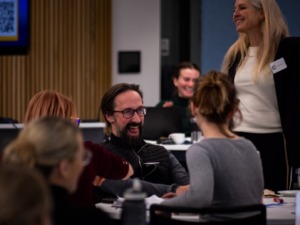
An evaluation of a group of executive students at Cranfield University evidences an increase in participants’ understanding of the systemic relationship between business and society, what sustainability means in business and the importance of relationships in effecting change. After playing the game, the senior leadership team at Lucion Group experienced an immediate 20% uplift in their belief that they could contribute to sustainable futures as individuals and a 16% uplift in their belief that they could do this together as an organisation. Both figures increased by a further 3% in the six months after the learning experience. Participants in a follow-up focus group attributed this increase in agency to the understandings, awareness and relationships developed during the game.
“The game was a truly immersive experience. It was thought-provoking and insightful and absolutely helped everyone who participated understand the scale of the challenges we face. Importantly, it helped us all to consider what we could do within Lucion Group to reduce our dependency on carbon. The message was clear, we must take action to hit and exceed carbon reduction targets by 2050 to safeguard our planet.”
-Jeremey Meredith, Managing Director of Lucion Services
The game has been recognised by the Financial Times as being an example of best practice in teaching about sustainability and was showcased at the COP26 and COP28 climate conferences.
The Exploring Sustainable Futures game was developed by Dr Rosina Watson, Associate Professor and Head of Sustainable Business at Cranfield University, and Gemma Adams Experiential Learning Consultant at Beeworx. Visit www.cranfield.ac.uk/sustainablegame to find out more about the game and join the waiting list of organisations interested in using this tool to equip their leaders for the future.
Explore Cranfield University programmes and courses that feature the game
- Part-time executive programmes: Sustainability Business Specialist Apprenticeship with Sustainability MSc | Senior Leader Executive Programme
- Short courses: Leading Sustainability
- Full-time postgraduate programmes: The Transformation MBA, Management and Corporate Sustainability MSc
References
- Leadership education for sustainability (cranfield.ac.uk)
- Förster, R., Zimmermann, A. B., & Mader, C. (2019). Transformative teaching in Higher Education for Sustainable Development: Facing the challenges. GAIA – Ecological Perspectives for Science and Society, 28, 324–326.
- Thomas, I. (2009). Critical thinking, transformative learning, sustainable education, and problem-based learning in universities. Journal of Transformative Education, 7. https://doi.org/10.1177/1541344610385753
- Kolb, D. A. (1984). Experiential learning: Experience as the source of learning and development, David A. Kolb, Prentice-Hall International, Hemel Hempstead, Herts., 1984. No. of pages: xiii + 256. Journal of Organizational Behavior, 8.
- Stanitsas, M., Kirytopoulos, K., & Vareilles, E. (2019). Facilitating sustainability transition through serious games: A systematic literature review. Journal of Cleaner Production, 208, 924–936.
- Dator, J. (2017). Alternative futures. Journal of Futures Studies, 22, 75-80.
- Costikyan, G. (2013). Uncertainty in games. MIT Press.
Categories & Tags:
Leave a comment on this post:
You might also like…
Keren Tuv: My Cranfield experience studying Renewable Energy
Hello, my name is Keren, I am from London, UK, and I am studying Renewable Energy MSc. My journey to discovering Cranfield University began when I first decided to return to academia to pursue ...
3D Metal Manufacturing in space: A look into the future
David Rico Sierra, Research Fellow in Additive Manufacturing, was recently involved in an exciting project to manufacture parts using 3D printers in space. Here he reflects on his time working with Airbus in Toulouse… ...
A Legacy of Courage: From India to Britain, Three Generations Find Their Home
My story begins with my grandfather, who plucked up the courage to travel aboard at the age of 22 and start a new life in the UK. I don’t think he would have thought that ...
Cranfield to JLR: mastering mechatronics for a dream career
My name is Jerin Tom, and in 2023 I graduated from Cranfield with an MSc in Automotive Mechatronics. Originally from India, I've always been fascinated by the world of automobiles. Why Cranfield and the ...
Bringing the vision of advanced air mobility closer to reality
Experts at Cranfield University led by Professor Antonios Tsourdos, Head of the Autonomous and Cyber-Physical Systems Centre, are part of the Air Mobility Ecosystem Consortium (AMEC), which aims to demonstrate the commercial and operational ...
Using grey literature in your research: A short guide
As you research and write your thesis, you might come across, or be looking for, ‘grey literature’. This is quite simply material that is either unpublished, or published but not in a commercial form. Types ...







